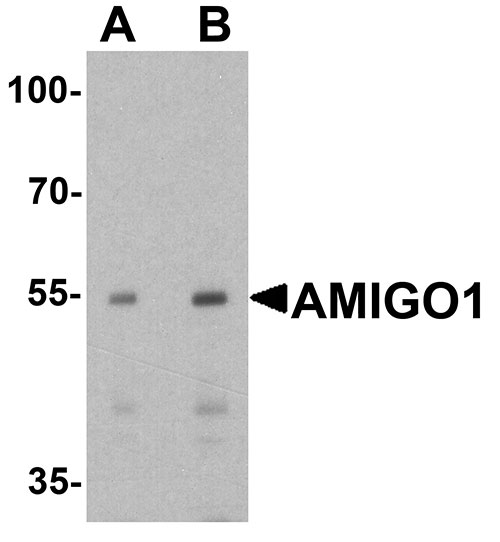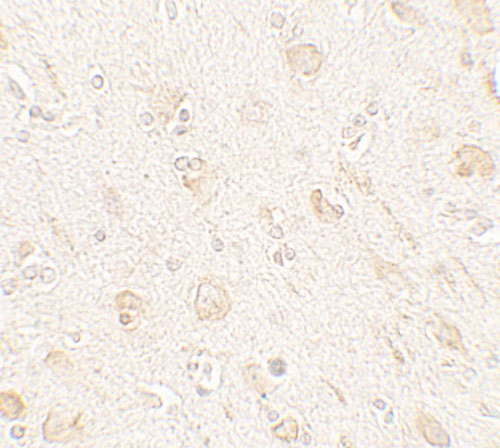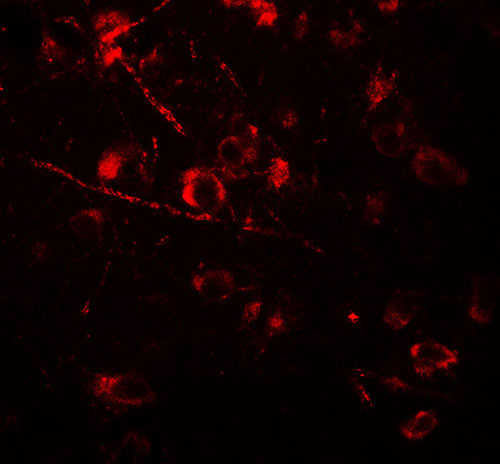AMIGO1 Antibody
- SPECIFICATION
- CITATIONS
- PROTOCOLS
- BACKGROUND

Application
| WB, IHC-P, IF, E |
|---|---|
| Primary Accession | Q86WK6 |
| Other Accession | NP_065754, 153791466 |
| Reactivity | Human, Mouse, Rat |
| Host | Rabbit |
| Clonality | Polyclonal |
| Isotype | IgG |
| Calculated MW | Predicted: 54 kDa Observed: 55 kDa |
| Application Notes | AMIGO1 antibody can be used for detection of AMIGO1 by Western blot at 1 - 2 µg/ml. Antibody can also be used for Immunohistochemistry starting at 5 µg/mL. For immunofluorescence start at 20 µg/mL. |
| Gene ID | 57463 |
|---|---|
| Target/Specificity | AMIGO1; AMIGO1 antibody is human, mouse, and rat reactive. AMIGO1 antibody is predicted to not cross-react with AMIGO2 or AMIGO3. |
| Reconstitution & Storage | AMIGO1 antibody can be stored at 4℃ for three months and -20℃, stable for up to one year. |
| Precautions | AMIGO1 Antibody is for research use only and not for use in diagnostic or therapeutic procedures. |
| Name | AMIGO1 (HGNC:20824) |
|---|---|
| Function | Promotes growth and fasciculation of neurites from cultured hippocampal neurons. May be involved in fasciculation as well as myelination of developing neural axons. May have a role in regeneration as well as neural plasticity in the adult nervous system. May mediate homophilic as well as heterophilic cell-cell interaction and contribute to signal transduction through its intracellular domain. Assembled with KCNB1 modulates the gating characteristics of the delayed rectifier voltage-dependent potassium channel KCNB1. |
| Cellular Location | Cell membrane {ECO:0000250|UniProtKB:Q80ZD8}; Single-pass type I membrane protein {ECO:0000250|UniProtKB:Q80ZD8} Perikaryon {ECO:0000250|UniProtKB:Q80ZD8}. Cell projection, dendrite {ECO:0000250|UniProtKB:Q80ZD8}. Cell projection, axon {ECO:0000250|UniProtKB:Q80ZD7}. Note=Colocalizes with KCNB1 at high- density somatodendritic clusters on the surface of hippocampal and cortical neurons. Associated with axons of neuronal cells {ECO:0000250|UniProtKB:Q80ZD7, ECO:0000250|UniProtKB:Q80ZD8} |

Thousands of laboratories across the world have published research that depended on the performance of antibodies from Abcepta to advance their research. Check out links to articles that cite our products in major peer-reviewed journals, organized by research category.
info@abcepta.com, and receive a free "I Love Antibodies" mug.
Provided below are standard protocols that you may find useful for product applications.
Background
The amphoterin-induced gene and ORF (AMIGO1) protein is a brain-enriched, glycosylated transmembrane immunoglobulin (Ig) superfamily protein with six extracellular leucine-rich repeats (LRRs) and one Ig-like domain. It and the related proteins AMIGO2 and AMIGO3 are thought to be cell adhesion molecules expressed on fiber tracts of neuronal tissues and participate in their formation (1). AMIGO1 has also been suggested to play important roles in dendritic outgrowth during development and could modulate the survival of developing and adult neurons (2).
References
Kuja-Panula J, Kiiltomaki M, Yamashiro T, et al. AMIGO, a transmembrane protein implicated in axon tract development, defines a novel protein family with leucine-rich repeats. J. Cell Biol. 2003; 160:963-73.
Chen Y, Hor HH, and Tang BL. AMIGO is expressed in multiple brain cell types and may regulate dendritic growth and neuronal survival. J. Cell Physiol. 2012; 227:2217-29.
If you have used an Abcepta product and would like to share how it has performed, please click on the "Submit Review" button and provide the requested information. Our staff will examine and post your review and contact you if needed.
If you have any additional inquiries please email technical services at tech@abcepta.com.













 Foundational characteristics of cancer include proliferation, angiogenesis, migration, evasion of apoptosis, and cellular immortality. Find key markers for these cellular processes and antibodies to detect them.
Foundational characteristics of cancer include proliferation, angiogenesis, migration, evasion of apoptosis, and cellular immortality. Find key markers for these cellular processes and antibodies to detect them. The SUMOplot™ Analysis Program predicts and scores sumoylation sites in your protein. SUMOylation is a post-translational modification involved in various cellular processes, such as nuclear-cytosolic transport, transcriptional regulation, apoptosis, protein stability, response to stress, and progression through the cell cycle.
The SUMOplot™ Analysis Program predicts and scores sumoylation sites in your protein. SUMOylation is a post-translational modification involved in various cellular processes, such as nuclear-cytosolic transport, transcriptional regulation, apoptosis, protein stability, response to stress, and progression through the cell cycle. The Autophagy Receptor Motif Plotter predicts and scores autophagy receptor binding sites in your protein. Identifying proteins connected to this pathway is critical to understanding the role of autophagy in physiological as well as pathological processes such as development, differentiation, neurodegenerative diseases, stress, infection, and cancer.
The Autophagy Receptor Motif Plotter predicts and scores autophagy receptor binding sites in your protein. Identifying proteins connected to this pathway is critical to understanding the role of autophagy in physiological as well as pathological processes such as development, differentiation, neurodegenerative diseases, stress, infection, and cancer.




